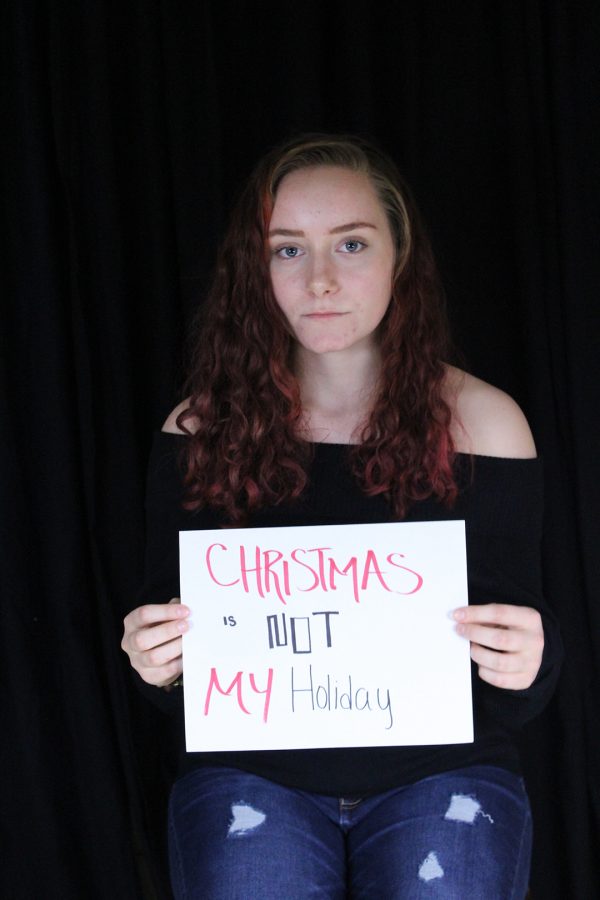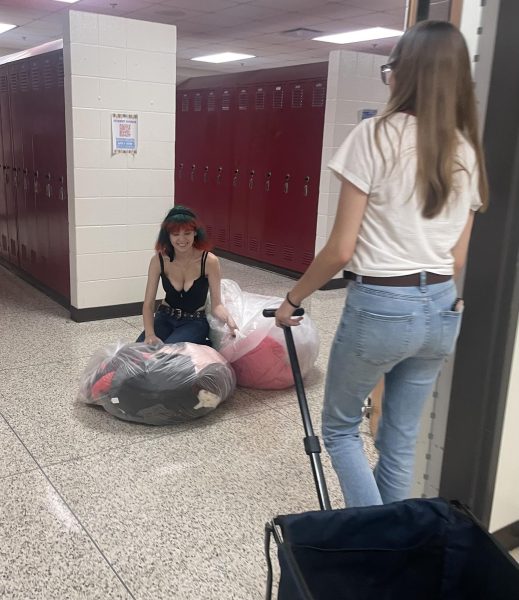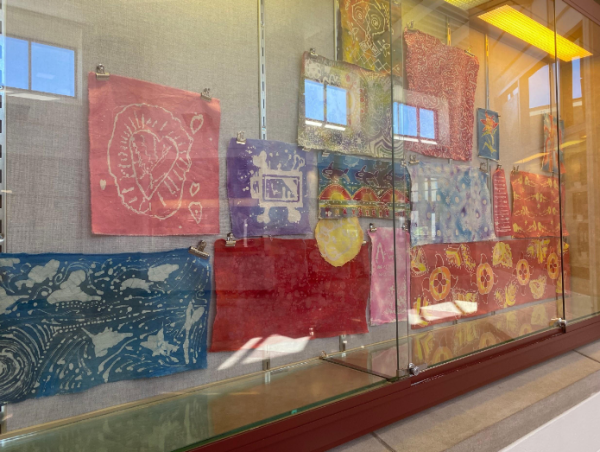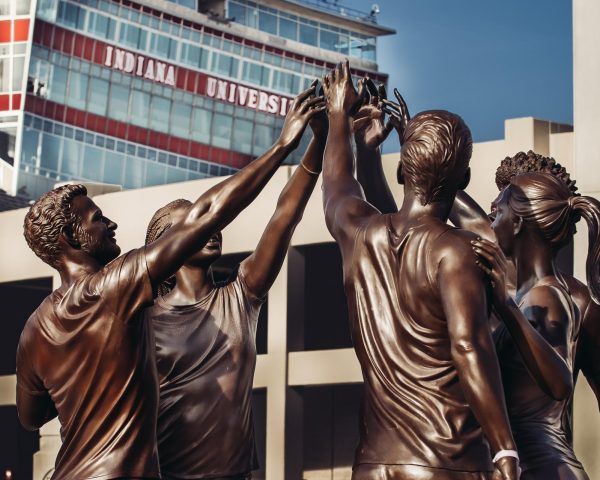How North Students Celebrate Holidays: Christmas Isn’t the Only Thing Out There
Craig poses with a sign illustrating her position.
Until her freshman year of high school, North Junior Savanah Craig celebrated Christmas with her family. Then, two years ago, she discovered Buddhism. During her freshman year, while taking world history, she learned about Buddhism during a religious studies unit. After researching some more on her own, she discovered that she really connected with the religion.
“It really just clicked,” Craig said.
Now, the holidays can be a difficult time of year. Craig’s whole family still celebrates Christmas, and sometimes she feels left out.
“It’s a little awkward,” she said. “With the addition of being vegan, it makes it a lot more difficult, because holidays in America are really centered around family and food.”
Craig said that while her immediate family, especially her mom, tries to be supportive of her beliefs, some of her extended family can be a little insensitive.
“I come from a strong, southern background and they’re very into their traditions,” she said. “When I say ‘oh I don’t want that, because I’m vegan,’ they’re kind of like ‘oh, that’s cool, sure,’ and they kind of make side comments and stuff. They’re not really supportive, they’re not outright against it, but they just kind of don’t understand it that well.”
Despite the backlash that she sometimes receives, Craig holds true to her positions. Her immediate family does not have very many Christmas traditions. At her family Christmas, she eats dinner and hangs out with her family. Her family even still gives her gifts.
“I have nice family time, it’s just not Christmas-oriented for me,” she said.
Craig practices being kind to everyone, and caring for the world around her. She tries to be happy, but not interfere with anyone else’s happiness in doing so. Part of this is accepting everyone else’s beliefs and holidays. However, Craig finds that everywhere she goes around this time of year, someone is doing something for Christmas.
“I was in weightlifting, and they had Christmas music on,” she said. “Before that I was in physics, and they had Christmas music on. Everything is just so Christmas-oriented. It’s not that it bothers me, as much as that it gets shoved down my throat so often it starts to get on my nerves, because it’s not my religion, it’s not my holiday, but every five seconds someone’s like ‘Christmas this, and Christmas that.’”
Craig is certainly not the only one that feels this way. There are so many different holidays that are celebrated around this time of year, but American culture prioritizes Christmas.
However, there are many other wonderful holidays that people all around the world take part in.
North Freshman Joelle Jackson and her family have always celebrated Hanukkah. Hanukkah, also known as the Festival of Lights, is a Jewish holiday commemorating the rededication of the Second Temple in Jerusalem. It usually falls sometime between Thanksgiving and New Years in the U.S., and this year will be from Dec. 24 through Jan. 1.
Jackson loves Hanukkah and looks forward to it every year. One of her favorite things about the holiday is the food that she gets to eat, especially latkes. Latkes, which are fried potato pancakes, are a very traditional Jewish food, usually eaten on Hanukkah. It is very traditional to eat fried foods on Hanukkah because the holiday celebrates Jewish people having enough oil to light a lamp for eight days.
Hanukkah is usually celebrated over a period of eight days, with one gift received each night. However, Jackson and her family celebrate it a little differently.
“My family is always focused on not focusing on monetary and material goods,” she said. “This year, instead of presents, every night of Hanukkah we’re going to make a little donation to a different organization.”
Jackson says that her family has always been casual about the holiday.
“Some people like to do it where you get a present every night, and that’s perfectly fine, but my family doesn’t really do that,” she said. “We’re more focusing on spending time with family and having fun and enjoying the holiday.”
Sophomore Teddy Waxler also celebrates Hanukkah every year with his dad’s side of the family. He makes latkes, plays dreidel every other night, exchanges gifts, and participates in other traditional festivities. On his mom’s side, however, he celebrates Christmas.
One of his favorite traditions that his family has is a game that they call “Dirty Bingo.”
“It’s pretty much just ordinary bingo, but I have all my relatives from my mom’s side,” he said.“We play bingo, and when you get bingo you pick out a present. When there’s no presents left you start stealing presents.”
Otherwise, his family just does traditional Hanukkah stuff every year.
Another popular winter holiday is Kwanzaa. Kwanzaa, unlike Hanukkah and Christmas, has not been around for very long. Created by Maulana Karenga in 1966, Kwanzaa is a seven day festival celebrating black and African culture. Many people who celebrate Kwanzaa also celebrate Christmas, as Kwanzaa is not a religiously-rooted holiday.
“Kwanzaa basically is a black American holiday that was started when black people were being excluded from churches at Christmas to celebrate,” Bella Brown-Sparks said. “So they basically invented their own holiday. It ends on New Year’s and starts the days after Christmas.”
Sophomore Isabella Brown-Sparks and her family have always celebrated Kwanzaa, as well as celebrating Christmas. They celebrate the holiday relatively traditionally, honoring each day with a different theme.
“Each day is about a different subject, so the first day is about family, the next day is about hope, and on the last day you get presents and there’s a feast,” Brown-Sparks said.
She said that in the last day she and her family each exchange one meaningful gift with each other.
“My favorite thing is probably on the last day when everyone is together,” she said. “It’s just fun to be around everyone.”
Brown-Sparks also said that because her family is Creole, they always eat Creole foods, like gumbo.
“We always, always have Creole,” she said.
She said that the holiday is important to her to honor the tradition of Kwanzaa because it is something that her ancestors had to fight for.
“It’s important to me that I’m bringing on a tradition because it’s something they had to create their own when they were getting blocked out of something,” Brown-Sparks said.
Besides Hanukkah and Kwanzaa, there a hundreds of other festivals that are celebrated around what many people consider the Christmas season.
And of course, there is always the New Year.
New Year’s Eve in America is a party holiday, which sometimes involves staying up late, dressing up nice, drinking champagne, and watching the Ball Drop in Times Square.
However, there are many other New Year celebrations. One such tradition is the Native American holiday Nuyuh, which is celebrated by the Tuscarora tribe.
Ana Stahlman and her family will travel to New York this year to celebrate the holiday with their family and other tribe members. Although they have not always done this, Stahlman is excited to celebrate it this year with everyone.
Nuyuh is similar to Halloween, or the Jewish holiday of Purim. You travel around to other family members’ houses, and they give out sweets such as cookies and other treats. They also tell traditional folklore stories.
One such story is the story of the three sisters, or corns, beans, and squash. The story tells how each one needed something different and argued all the time, but finally Mother Earth told them they needed to stop arguing and come together to be who they are.
Another story is the story of the no face girl, which is a cautionary tale.
“This one’s kind of a bad thing, so it’s not to be so selfish and so concerned,” Stahlman said. “Her mom told her to go get water, and every time she went to go get water, she went to look at herself in the mirror, like in the reflection. Her mom told her not to look at herself in the reflection anymore. If she looked at herself in the reflection her face would go away, and eventually her face went away.”
After traveling to relatives’ houses, there is a feast. There is a competition between the young and old men of the family to get the most meat. Afterwards, the whole family eats a meal together, and then goes back home.
Differing holidays that are passed down to be celebrated such as these are very important, as is discovering the holiday you want to celebrate and starting your own traditions. Holidays remind us of our ancestors and of the people that will come after us. They are also a great time to spend with your family and participate in fun and carefree traditions.
No matter what you celebrate this season, have a very happy holiday.







